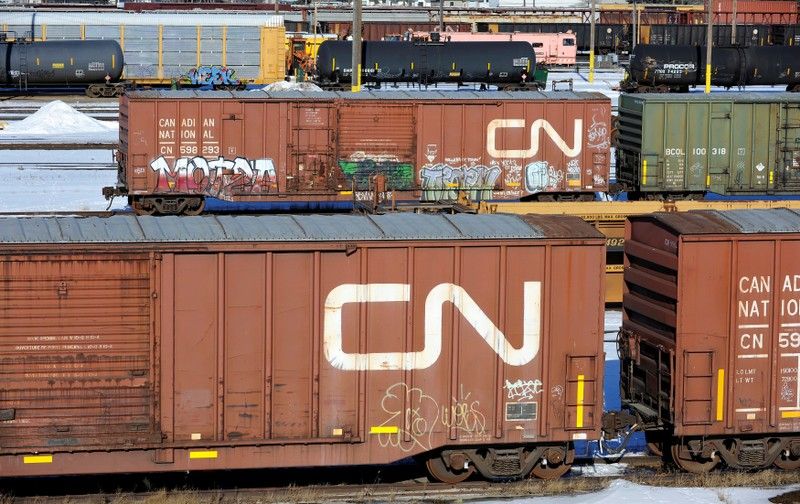- Backlogs could snag shippers
MONTREAL/WINNIPEG (Reuters) – Canada’s longest railroad strike in a decade ended on Tuesday as Canadian National Railway Co reached a tentative agreement with workers, but shippers warned it could take weeks before service bounces back to normal.
Industry groups celebrated the end of the eight-day strike at the country’s biggest railroad, which had cost them sales and raised their expenses. News of the deal, which must still be ratified by union members, sent CN shares up by as much as 2%.
Thousands of unionized workers began heading back to their jobs, CN said, with operations expected to be in full swing on Wednesday. Union members should vote on the deal within eight weeks.
CN has rescinded 70 temporary layoff notices at an auto shipment terminal in Nova Scotia following the deal, another union said.
Canada relies on CN and Canadian Pacific Railway to move crops, oil, potash, coal and manufactured goods to ports and the United States.
Details of the agreement were not available but some 3,200 striking conductors and yard workers had been demanding improved working conditions, including rest breaks.
Prime Minister Justin Trudeau acknowledged CN and union officials in a tweet on Tuesday and thanked workers, industry and all Canadians for their patience.
Trudeau’s minority government had faced pressure from industry and farmers to end the strike and force workers back to their jobs.
Transport Minister Marc Garneau told reporters on Tuesday that if Ottawa had intervened with legislation, “we would not have had a solution today.”
Teamsters Canada President Francois Laporte noted the federal government “remained calm and focused.” CEO of Montreal-based CN J.J. Ruest thanked customers for their patience.
About half of Canada’s exports move by rail, according to industry data, and the strike would likely cost the Canadian economy less than C$1 billion ($750 million) and cut fourth-quarter growth by about 0.1 percentage point, Brian DePratto, a senior economist at TD, said.
PROPANE SHORTAGE TO PERSIST
The Canadian Propane Association warned severe shortages of the fuel in several eastern Canadian provinces could last weeks. “We need to get the inventory back up,” said association President Nathalie St-Pierre, noting the “crisis” was not over.
Garneau said CN will work quickly to clear the backlog, but added the process is complex and would take time.
Bob Masterson, chief executive of the Chemistry Industry Association of Canada, said some plants had slowed production during the strike.
Based on past rail disruptions, he said CN is likely to move critical commodities first, like propane for farms and homes and chlorine for drinking water, leaving other shippers to face delays.
PAIN FOR MINERS, FARMERS
Brendan Marshall, a vice president with the Mining Association of Canada, said miners faced hefty costs due to lost sales and plant disruptions. He said restoring normal operations could take a week for every day of disrupted service.
“Now we can hope that things can get back to normal in quick fashion. It’s cost a lot of money to farmers already,” said Markus Haerle, chairman of the Grain Farmers of Ontario. Wet conditions have stalled the harvest across much of Canada, including much of Haerle’s corn crop near St. Isidore, Ontario. Those crops must be dried before they can be sold, but the rail strike held up deliveries of propane, forcing farmers to use costlier alternatives.
(Reporting by Allison Lampert in Montreal and Rod Nickel in Winnipeg. Additional reporting by Kelsey Johnson in Ottawa, writing by Steve Scherer, editing by Louise Heavens, Steve Orlofsky and David Gregorio)

